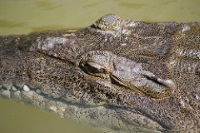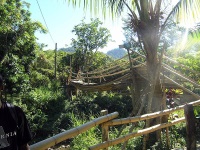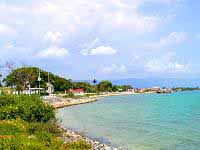Negril Travel Guide
Jamaica's western coastline is extremely laid-back. There's little to do other than sit back, relax and enjoy the renowned sunsets in between beach-lounging and partying. At the centre of this hedonistic haven is the sunny resort town of Negril, which has been dubbed the 'Capital of Casual'.
Despite its popularity, the destination has managed to retain the sleepy tropical charm that first seduced seekers of sun and solitude in the 1960s. It was the hippies and flower children who were first drawn to Negril, appreciating it for being different from the overdeveloped package-tour market of Montego Bay.
Negril still attracts a young crowd, and the beachfront bars and cafes are abuzz each night with reggae music and dancing. Negril is known in the Caribbean as a partying hotspot, and its nude beaches complete its liberal reputation.
The town is favoured by those just wanting to get away from it all. It sports a famous seven-mile (11km) stretch of pristine beach encircling Bloody Bay, and five miles (8km) of cliffs where locals and visitors alike indulge in extreme cliff-diving.
The coral reefs and caves along the coast make it a dream come true for scuba divers and snorkelers, and there's the chance to take part in just about any water sport imaginable, such as kayaking into the mysterious Great Morass, a protected area full of palm trees, exotic birds and crocodiles.
Runners should look out for Negril's ever-popular Reggae Marathon. The unique event takes place along some of Negril's finest white sandy beaches and has a sound system rigged up along the race route that plays reggae music to encourage participating athletes. Runners receive a traditional Rastafarian welcome at the start; international competitors should be prepared for the heat and hydrate well, as December is hot in Jamaica.
Things to do in Negril
Negril is a top destination for outdoor enthusiasts, who can kayak out into the protected wilderness of the Great Morass to see crocodiles and other wildlife in their natural habitat; go horse riding on the beach and through the jungle at Rhodes Hall Plantation; scuba dive or snorkel the beautiful coral reefs and caves along Negril's coast; or enjoy some extreme cliff-diving into the clear ocean water, a very popular activity with both locals and visitors.
There are also excursions into the surrounding countryside, such as a daytrip to Mayfield Falls, a natural water park where visitors can swim in the pools formed by 22 cascades. It's worth climbing the lighthouse on West End Road for lovely views of Negril's coastline. The lighthouse was built in 1894 and is open to visitors every day.
On the more untouched South Coast, visitors can explore the history of the region's rum production at the Appleton Estate or even enjoy a boat safari along the Black River, stopping along the way at YS Falls. The centre of the region is Mandeville, which was founded in 1816 and is home to the country's oldest golf course.
There is a reason, however, that this adventurer's paradise is called the 'Capital of Casual'. The most popular attraction in Negril is the famous Seven Mile Beach, where turquoise water and white sands create a paradise for lazy hedonists as well as active thrill-seekers. The Reggae Marathon held annually in December sees runners taking over Seven Mile Beach, but most of the time it's the territory of happy and relaxed tourists.
Seven Mile Beach
The reason for Negril's recent boom as a tourist destination is centred on this seven mile (11km) stretch of beautiful shoreline, which is dotted with palm trees and carpeted with pristine white sand. Development has been restricted to palm-tree height and, despite the proliferation of guesthouses and hotels along the strip, the natural beauty of the beach has not been compromised. There are lots of restaurants, resorts and shops along the beachfront but thankfully the length of the beach usually prevents it from becoming too crowded. There are myriad activities and watersports available at the beach and the snorkelling is wonderful too.

Rhodes Hall Plantation
The beautiful estate of Rhodes Hall Plantation lies a short distance east of Negril. Guided horseback excursions give a glimpse of the magic and mystery of the Jamaican countryside, and guides will help visitors with some basic horsemanship tips as they take them through the foothills, pointing out botanical wonders and regaling them with stories and legends about local landmarks. Visitors are taken through forests of banana and coconut palms, and along a beach to the Crocodile River, where hopefully groups can meet one of the resident crocodiles. Swimming gear is a must, as the horses like to head into the surf.

Mayfield Falls
The 22 mini-cascades and numerous swimming holes that comprise the Mayfield Falls in the low-lying Dolphin Head Mountains make for a memorable day trip from Negril. Tours offer guided walks through bamboo-shaded water holes and splashing falls. Some parts of the walk through the area involve natural whirlpools; in others, blasts of water from the rocks will hit visitors.
There is an underwater cave to swim through, and there are smooth rockslide areas and mini cliffs from which to dive. This natural water park is edged and overhung with flowers, vines and trees. Jamaican dishes are available at the eatery at the entry point, while there are also a number of stalls selling souvenirs and crafts at the end of the trail.

South Coast
The south of Jamaica is the most unspoilt part of this lovely Caribbean island. It's here that many say the true heart of the country still beats, as it's relatively untouched by the tourism and resort development evident on the rest of the island.
The centre of the region is the breezy hill town of Mandeville. Founded in 1816, the British colonial influence is strong, from the village green bordered by a church and courthouse to the Manchester Club, home to Jamaica's oldest golf course, which was founded in 1868.
Negril is technically also in the south coast region, but as a booming resort town it has a different atmosphere to the rest of the south. Visitors can explore the history of the region's rum production at the Appleton Estate or even enjoy a boat safari along the Black River, stopping along the way at YS Falls.
Jamaica travel info
Electricity
Electrical current is 110 volts, 50Hz. Flat two- and three-pin plugs are in use.
Language
The official language of Jamaica is English but a local patois is also spoken, which is a mixture of English, Spanish, and various African languages.
Money
The Jamaican dollar (JMD) is the local currency and is divided into 100 cents. The island is well supplied with ATMs, banks and bureaux de change, with banking hours usually running Monday to Thursday from 9am to 2pm, and Friday from 9am to 4pm. Cambio exchange offices are found throughout the country and often offer better exchange rates than banks, as do exchange bureaux at the airports and hotels. Travellers should retain receipts as proof of legal currency exchange. Major credit cards are widely accepted; cash is best taken in US dollars.
Tipping
Outside the all-inclusive resorts in Jamaica where tips are part of the package, visitors should tip 10 to 15 percent for taxis, personal services, room service and restaurants where a service charge is not already included in the bill. Parking attendants, bellboys and porters also expect a small tip.
Health
While generally safe, the tap water can cause stomach upsets and visitors are advised to drink bottled water. Mosquito-borne diseases, such as Zika, dengue fever and chikungunya have been confirmed. Private medical facilities are of a reasonable standard but can vary throughout the island, with facilities limited outside Kingston and Montego Bay. Medical treatment can be expensive so travel insurance is advised. If visitors require prescription medication, it's best to bring it with them, along with a signed and dated letter from their doctor naming the medication and explaining why they need it.
Safety
There are incidents of petty crime such as robbery, particularly in the capital city of Kingston and in Montego Bay. Tourists are advised to be cautious and take care of their belongings. It's best to avoid using buses at night and also to steer clear of any public demonstrations that may occur. Hurricane season runs from June to November. While it is rare for tropical storms to make landfall in Jamaica, visitors travelling at this time should monitor local and international weather updates for peace of mind.
Local customs
Contrary to popular belief, smoking marijuana is illegal in Jamaica. Homosexuality is also prohibited by law and the country is notorious for its intolerance towards it.
Doing business
Business in Jamaica is surprisingly formal, with proper titles used and suits and ties the norm despite the tropical climate. Introductions are usually made with a handshake and an exchange of business cards. Punctuality is key, and socialising is an important aspect of the business meeting. Business hours are usually from 8:30am to 4:30pm or 5pm on weekdays.
Duty free
Travellers to Jamaica over 18 years do not have to pay duty on 200 cigarettes or 50 cigars or 230g of other tobacco products; 1L alcoholic beverages and wine; and perfume up to 170ml. Prohibited items include products made from goatskin (e.g. drums, handbags and rugs).
Communications
The international access code for Jamaica is +1, in common with the US, Canada and most of the Caribbean, followed by 876. WiFi is available in the main towns, restaurants and resorts; travellers can purchase local prepaid SIM cards for unlocked phones.
Passport & Visa
All foreign visitors to Jamaica must hold proof of sufficient funds to cover their expenses while in the country, return or onward tickets, and the necessary travel documentation for their next destination. A yellow fever vaccination certificate is required to enter Jamaica if visitors are arriving from or have transited through an infected area. It is highly recommended that travellers' passports have at least six months' validity remaining after the intended date of departure from their travel destination. Immigration officials often apply different rules to those stated by travel agents and official sources.
Entry requirements
US citizens must have a passport to enter Jamaica that has to be valid upon their return to the USA. A visa is required for stays of over 90 days.
UK citizens must have a passport to enter Jamaica that is valid for the duration of their stay. No visa is required for stays of up to 90 days, with possible extensions up to six months granted on arrival.
Canadian citizens require a passport valid for period of intended stay. No visa is required for stays of fewer than 90 days.
Australian citizens must have a passport that is valid for the period of intended stay in Jamaica. No visa is required for stays of up to 90 days, with possible extensions granted by immigration.
South African citizens must have a passport that is valid for the period of intended stay in Jamaica. No visa is required for tourism for stays of up to six months.
Irish citizens must have a passport that is valid for the period of intended stay in Jamaica. No visa is required for stays of up to 90 days, with longer stays subject to immigration approval.
New Zealand citizens must have a passport that is valid for the period of intended stay in Jamaica. No visa is required for stays of up to six months.
Useful contacts
www.visitjamaica.com
119 (Police); 110 (Ambulance, Fire)


